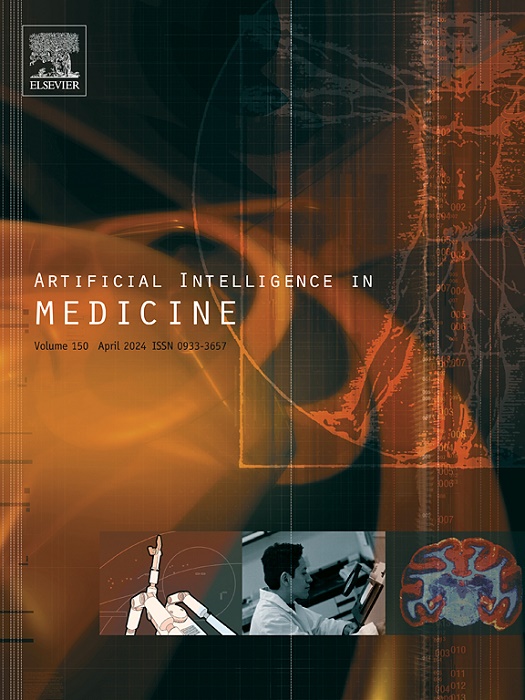深度学习用于糖尿病患者慢性肾脏疾病分期的早期检测:TabNet方法
IF 6.2
2区 医学
Q1 COMPUTER SCIENCE, ARTIFICIAL INTELLIGENCE
引用次数: 0
摘要
慢性肾脏疾病(CKD)对糖尿病患者有很大的风险,经常导致严重的并发症。早期准确的CKD分期检测对于及时干预至关重要。然而,由于其无症状进展,糖尿病检查期间常规CKD检查的疏忽,以及肾病学家的限制,它仍然具有挑战性。本研究旨在通过使用慢性肾功能不全队列(CRIC)研究的纵向数据,为糖尿病患者开发一个多类别CKD分期预测模型来解决这些挑战。采用一种新颖的迭代后向特征选择策略来确定CKD分期的关键预测因子。采用基于注意力的深度学习架构TabNet构建完整和简化类别的分类模型。完整的模型使用了31个特征,包括复杂的肾脏生物标志物,而简化的模型使用了常规检查中容易获得的15个特征。将TabNet的性能与传统的基于树的集成方法(XGBoost、随机森林、AdaBoost)和多层感知器进行了比较。应用特定于模型和模型不可知的可解释AI (XAI)技术来解释模型决策,提高了所提出方法的透明度和临床适用性。TabNet模型在完整模型和简化模型上的交叉验证准确率分别达到94.06%和92.71%,在测试集上的交叉验证准确率分别达到91.00%和88.00%。XAI分析发现血清肌酐、胱抑素C、性别和年龄是CKD分期的最重要影响因素。提出的TabNet模型为糖尿病患者早期CKD严重程度检测提供了一种强大的方法,有可能改善临床决策和患者预后。本文章由计算机程序翻译,如有差异,请以英文原文为准。
Deep learning for early detection of chronic kidney disease stages in diabetes patients: A TabNet approach
Chronic kidney disease (CKD) poses a significant risk for diabetes patients, often leading to severe complications. Early and accurate CKD stage detection is crucial for timely intervention. However, it remains challenging due to its asymptomatic progression, the oversight of routine CKD tests during diabetes checkups, and limited access to nephrologists. This study aimed to address these challenges by developing a multiclass CKD stage prediction model for diabetes patients using longitudinal data from the Chronic Renal Insufficiency Cohort (CRIC) study. A novel iterative backward feature selection strategy was employed to determine key predictors of the CKD stage. TabNet, an attention-based deep learning architecture, was used to build classification models in complete and simplified categories. The complete model used 31 features, including complex kidney biomarkers, while the simplified model used 15 features readily available from routine checkups. The performance of TabNet was compared against traditional tree-based ensemble methods (XGBoost, random forest, AdaBoost) and a multi-layer perceptron. Model-specific and model-agnostic explainable AI (XAI) techniques were applied to interpret model decisions, enhancing the transparency and clinical applicability of the proposed approach. The TabNet models demonstrated superior performance, achieving 94.06 % and 92.71 % accuracy in cross-validation for the complete and simplified models, respectively, and 91.00 % and 88.00 % accuracy on test sets. XAI analysis identified serum creatinine, cystatin C, sex, and age as the most influential factors in CKD stage classification. The proposed TabNet models offer a robust approach for early CKD severity detection in diabetes patients, potentially improving clinical decision-making and patient outcomes.
求助全文
通过发布文献求助,成功后即可免费获取论文全文。
去求助
来源期刊

Artificial Intelligence in Medicine
工程技术-工程:生物医学
CiteScore
15.00
自引率
2.70%
发文量
143
审稿时长
6.3 months
期刊介绍:
Artificial Intelligence in Medicine publishes original articles from a wide variety of interdisciplinary perspectives concerning the theory and practice of artificial intelligence (AI) in medicine, medically-oriented human biology, and health care.
Artificial intelligence in medicine may be characterized as the scientific discipline pertaining to research studies, projects, and applications that aim at supporting decision-based medical tasks through knowledge- and/or data-intensive computer-based solutions that ultimately support and improve the performance of a human care provider.
 求助内容:
求助内容: 应助结果提醒方式:
应助结果提醒方式:


